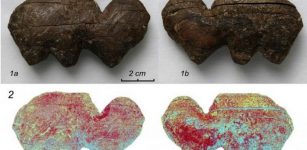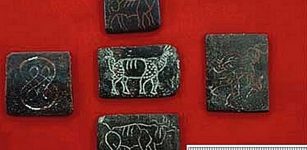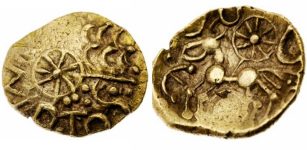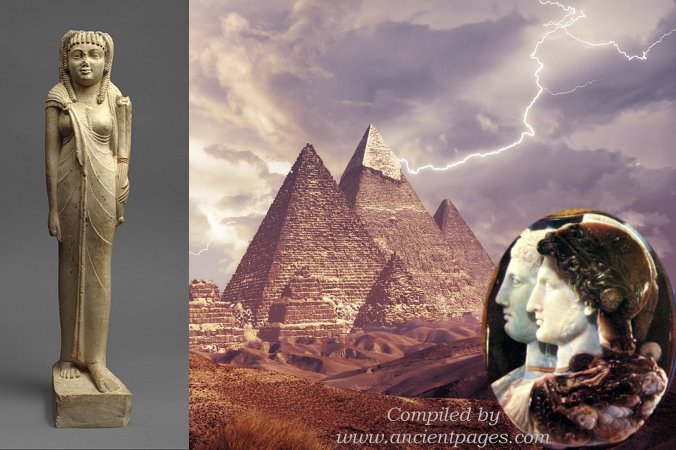Arsinoe II Rose To Power Through Manipulations, Murder, Conspiracies And Became Worshiped As A Goddess
Ellen Lloyd - AncientPages.com - Arsinoe II was an interesting personality in the history of ancient Egypt. She rose to power through dubious means. Historical records show murder, manipulations, and conspiracies followed in her footsteps.
Left: Statuette of Arsinoe II for her Posthumous Cult. Credit: Met Museum - Middle: Egyptian pyramids. Credit: Public Domain - Right bottom: Ptolemy II and Arsinoe II. Credit Public Domain
Looking through the eyes of ancient Egyptians, Arsinoe II was almost superhuman, and there is little doubt she was a true fighter, but there is also enough historical evidence to say she was a cunning and deceptive woman who hid her true dark nature. Arsinoe II has been accused of many crimes, but are all stories about her really true? Did the tragedy she experienced turn her into a courageous woman or was she evil from the beginning?
Who Was Arsinoe II?
Born in Memphis around 316 B.C., there is little information about Arsinoe's early years. Shew as the first daughter of Pharaoh Ptolemy I Soter and his wife his second wife, Berenice I of Egypt. Though it has not been confirmed, historians think she received a good education as a young girl.
When Arsinoe was 15 years, she married King Lysimachus, who was 60 years. Together they had three sons, Ptolemy, Epigonos, Lysimachus, and Philip. Arsinoe wanted her son to ascend the throne, but Lysimachus' first son, Agathocles, was an obstacle. Arsinoe was not particularly fond of Agathocles, who had previously rejected her advances. In 284, Agathocles was poisoned and executed for treason.
It is unclear whether his stepmother Arsinoe II had something to do with his death or if his own father was acting independent, believing his son was conspiring against him. What is known is that once Agathocles was out of the way, Arsinoe's son could become the new ruler. However, the events that followed were unfortunate for Arsinoe. After her husband, King Lysimachus, died in battle in 281 B.C, she fled to Cassandreia, one of the most important cities in ancient Macedonia, founded by and named after Cassander in 316 B.C.
From Conspiracy And Murders To Queen Of Ancient Egypt – Life Of Arsinoe II Was Dramatic
More trouble and tragedy followed, and Arsinoe's life started to become miserable, but she was a strong-willed woman who was determined to survive. Her two sons were murdered by Ptolemy Keraunos, her half-brother whom she married after her first husband's death. According to historians, King Ptolemy Keraunos was informed his wife conspired with her sons against him and decided to kill her children.
In "A Portrait of Arsinoe Philadelphos," Dorothy Burr writes that "her older son, Ptolemy, escaped.
She herself was in grave danger of her life at the hands of her new husband, but luckily the Gauls intervened, killed Keraunos, and carried his head as a mascot on their further campaigns. Arsinoe and her son escaped to Egypt. There she again exercised her charms and energy to control her brother, King Ptolemy II. Soon she had guided him to expel his wife, her step-sister, to marry herself and adopt her son as his heir."
The fact that she was the king's full sister did not give her or him any second thoughts, and they married in 276 or 275 B.C.
As queen of Egypt, she acted alongside her brother in ritual and public display. Arsinoe II became a respected and influential ruler with towns dedicated to her. She also had her own cult, and her image appeared on coins.
Coin of Arsinoe II struck under the rule of her husband-brother Ptolemy II Philadelphus. Credit: Classical Numismatic Group, Inc, CC BY-SA 3.0
She was intelligent and interested in foreign policy. According to historians, she contributed to her brother's victory in the First Syrian War between Egypt and the Seleucid Empire by re-organizing the army.
After her death, on July 9, 270 B.C., as recorded on the Medes stele, her brother continued to refer to her in documents, and Arsinoe II became worshiped as a goddess in ancient Egypt.
Today, it's difficult to say with certainty whether Arsinoe II did commit everything she has been accused of. Maybe sad events forced her to do things she would never have done in the first place. Maybe she was just a woman who tried to survive living under difficult conditions. Still, whatever the truth may be, documented events reveal she rose to power under unusual circumstances, and intrigues were common in her life.
Written by Ellen Lloyd – AncientPages.com
Updated on September 4, 2022
Copyright © AncientPages.com All rights reserved. This material may not be published, broadcast, rewritten or redistributed in whole or part without the express written permission of AncientPages.com
Expand for referencesThompson, Dorothy Burr. "A Portrait of Arsinoe Philadelphos." American Journal of Archaeology 59, no. 3 (1955): 199-206. doi:10.2307/500319.
Elizabeth Donnelly Carney - Arsinoe of Egypt and Macedon: A Royal Life
More From Ancient Pages
-
 Homo Sapiens In China And What Happened When They Encountered Denisovans Or Neanderthals
Archaeology | Mar 4, 2022
Homo Sapiens In China And What Happened When They Encountered Denisovans Or Neanderthals
Archaeology | Mar 4, 2022 -
 Chartres – Symbol Of Power And Secret Ancient Knowledge
Ancient Symbols | Nov 28, 2018
Chartres – Symbol Of Power And Secret Ancient Knowledge
Ancient Symbols | Nov 28, 2018 -
 Mysterious Location Of The Amazing Land Of Punt – Can This Puzzle Be Solved One Day?
Featured Stories | Jul 18, 2016
Mysterious Location Of The Amazing Land Of Punt – Can This Puzzle Be Solved One Day?
Featured Stories | Jul 18, 2016 -
 New Path For Early Human Migrations Contradicts A Single ‘Out Of Africa’ Theory
Evolution | Oct 5, 2023
New Path For Early Human Migrations Contradicts A Single ‘Out Of Africa’ Theory
Evolution | Oct 5, 2023 -
 On This Day In History: Noah Webster, Jr. “Father Of American Scholarship And Education” Was Born – On Oct 16, 1758
News | Oct 16, 2016
On This Day In History: Noah Webster, Jr. “Father Of American Scholarship And Education” Was Born – On Oct 16, 1758
News | Oct 16, 2016 -
 Bellerophon: Great Hero Of Homer’s Iliad Who Was Punished By Gods For His Pride And Arrogance
Featured Stories | Jul 13, 2021
Bellerophon: Great Hero Of Homer’s Iliad Who Was Punished By Gods For His Pride And Arrogance
Featured Stories | Jul 13, 2021 -
 Sea Sequin ‘Bling’ Links Indonesian Islands’ Ancient Communities
Archaeology | Aug 16, 2023
Sea Sequin ‘Bling’ Links Indonesian Islands’ Ancient Communities
Archaeology | Aug 16, 2023 -
 Fossil Of Extinct Human Species Reveals Climate Change Led To Unexpected Anatomical Changes 2 Million Years Ago
Archaeology | Nov 11, 2020
Fossil Of Extinct Human Species Reveals Climate Change Led To Unexpected Anatomical Changes 2 Million Years Ago
Archaeology | Nov 11, 2020 -
 Lost Knowledge Of Energy And Crystal Technology In Ancient Egypt
Ancient Mysteries | May 17, 2019
Lost Knowledge Of Energy And Crystal Technology In Ancient Egypt
Ancient Mysteries | May 17, 2019 -
 Two Scribes Penned 8th Century ‘Samaria Ostraca’ Inscriptions Unearthed In Samaria
Archaeology | Jan 23, 2020
Two Scribes Penned 8th Century ‘Samaria Ostraca’ Inscriptions Unearthed In Samaria
Archaeology | Jan 23, 2020 -
 Inscription On Rare Tetrarchic Boundary Stone Found At Biblical Site Of Abel Beth Maacah, Israel Has Been Deciphered
Archaeology | Jan 21, 2025
Inscription On Rare Tetrarchic Boundary Stone Found At Biblical Site Of Abel Beth Maacah, Israel Has Been Deciphered
Archaeology | Jan 21, 2025 -
 Enigmatic Footprints Reveal Humans Were In Spain 200,000 Years Earlier Than Previously Thought
Archaeology | Nov 11, 2022
Enigmatic Footprints Reveal Humans Were In Spain 200,000 Years Earlier Than Previously Thought
Archaeology | Nov 11, 2022 -
 Ancient Mammoth Ivory Carving Technology Of Master Craftsmen – Reconstructed
Archaeology | Aug 27, 2020
Ancient Mammoth Ivory Carving Technology Of Master Craftsmen – Reconstructed
Archaeology | Aug 27, 2020 -
 On This Day In History: Battle Of Rhyndacus – Oct 15, 1211
News | Oct 15, 2016
On This Day In History: Battle Of Rhyndacus – Oct 15, 1211
News | Oct 15, 2016 -
 Eriu: Powerful Irish Goddess And Sacred Uisneach Hill Where She And God Lugh Are Buried
Celtic Mythology | Feb 15, 2019
Eriu: Powerful Irish Goddess And Sacred Uisneach Hill Where She And God Lugh Are Buried
Celtic Mythology | Feb 15, 2019 -
 Curious Ancient Copper Plates And The Mystery Of Indus Valley
Artifacts | Oct 24, 2015
Curious Ancient Copper Plates And The Mystery Of Indus Valley
Artifacts | Oct 24, 2015 -
 Unique Figurine of Roman God Mars Unearthed In Bulgaria
Artifacts | Aug 22, 2015
Unique Figurine of Roman God Mars Unearthed In Bulgaria
Artifacts | Aug 22, 2015 -
 Ancient Coin Reveals Name Of Unknown British Iron Age King – Who Was ‘Esunertos’?
Archaeology | Oct 21, 2023
Ancient Coin Reveals Name Of Unknown British Iron Age King – Who Was ‘Esunertos’?
Archaeology | Oct 21, 2023 -
 Vimanas – Flying Machines Soaring Through Ancient Sky Of India
Ancient Mysteries | May 27, 2014
Vimanas – Flying Machines Soaring Through Ancient Sky Of India
Ancient Mysteries | May 27, 2014 -
 The Hidden Face Of The Elusive Master
Ancient Mysteries | Jun 8, 2018
The Hidden Face Of The Elusive Master
Ancient Mysteries | Jun 8, 2018


